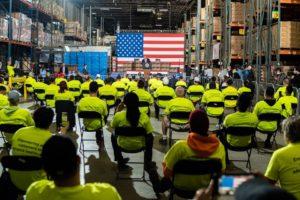By Recker McDowell —
The economy is reopening but it is going to take time to recoup the more than 36 million jobs lost to COVID-19 and the contagion’s shutdowns.
Veteran economist Elliott Pollack said Friday the economic recovery from the Coronavirus and its impacts could be a 2 to 5-year process.
Economists from the University of Chicago estimate as many as 42 percent of the lost jobs might not be coming back. That translates into 15 million jobs. There are already restaurants, retailers and other small businesses who have indicated they will not be reopening at all after the COVID-19 shutdown. Plenty of other companies are putting off new hires. Other employers will not bring back as many workers as they reopen and gauge the economy and how consumers and businesses are behaving and the impacts of social distancing.
This demands creativity, innovation and immediate actions throughout our economy, our communities, and our political system.
We know lives are at stake and the economy and businesses need to open safely and responsible. This holds true for restaurants, offices and sports and events venue.
We need the private sector to step forward with innovations, with new approaches and ways of doing business. We need economic developers, elected officials, and candidates in every community and at every level to have vision for how to create jobs, for how they will help important and hard-hit industries.
Employees should press their managers, bosses, and CEOs on how they are going to navigate these troubled waters and what are their short and long-term plans for coming out of this.
Voters should expect real answers from Donald Trump, Joe Biden, governors, mayors, city councilors and members of Congress, as well as anyone running for office on how we are going to create jobs and save businesses, especially small businesses.
 We know this might be above the current pay grades for some. But it is chance for businesses to innovate and create and for elected officials to show empathy and leadership.
We know this might be above the current pay grades for some. But it is chance for businesses to innovate and create and for elected officials to show empathy and leadership.
Creative and adaptive reuse of land and properties, regulatory, licensing and permitting reforms that help businesses retain and create job as well as tax, infrastructure investments and job training programs are starting points.
Conversely, elected officials should be listening to voters (including entrepreneurs and small businesses owners and especially impacted workers) on what might help them stay in business or find jobs.
At workplaces, employees need to engage and come up with ideas and changes on how to grow their careers and businesses. We all need to be thinking, praying, and innovating.
It might not be easy, but this is also a chance for workers and businesses to find better purpose to reset their goals and cultures.
The year 2020 is no time for conventional, top-down thinking.
We know there is fear, worry and lack of visibility on COVID-19 and the economy.
Many of history’s life changing innovations, inventions and transformations were born out of crises like pandemics. We are seeing and facing a lot of pain, but it is also a chance and an opportunity to save jobs and the economy while protecting and improving public health.
Let’s expect more of our ‘leaders’ and ourselves.

